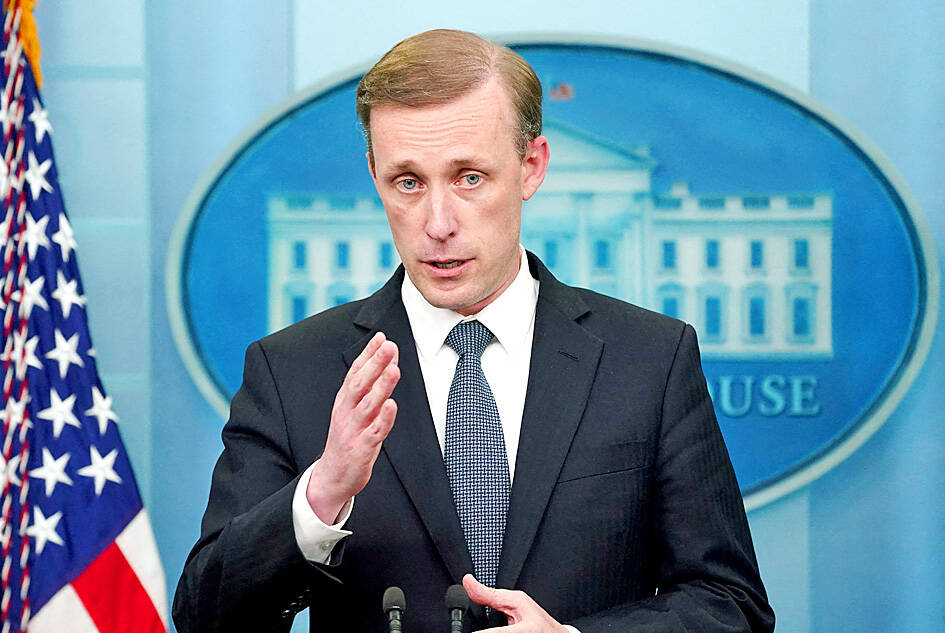US, Japanese and South Korean officials on Thursday discussed their joint commitment to peace and stability across the Taiwan Strait and other regional security topics at a trilateral meeting in Hawaii, a White House statement said.
Moreover, there would be no soft response from the three countries if North Korea were to hold a nuclear weapons test, Yonhap news agency yesterday cited South Korean National Security Office Director Kim Sung-han as telling his US and Japanese counterparts.
The comment came amid signs the North has completed preparations to conduct its first nuclear test since 2017.

Photo: REUTERS
“If North Korea conducts its seventh nuclear test, the response will be clearly different from the past,” Kim told Yonhap reporters on Thursday.
“We have agreed there should never be such a complacent thinking or response that North Korea has conducted just another nuclear test in addition to the six tests it did,” Kim said.
North Korea has conducted missile tests at an unprecedented pace this year.
In the middle of last month, it fired two cruise missiles from the west coast after South Korea and the US resumed their largest field exercises in years.
Pyongyang has long denounced them as a rehearsal for war.
During Thursday’s talks, the three officials also agreed to cooperate on global supply chain issues, while Kim separately raised concerns over new US rules on subsidies for electric vehicles, South Korea’s presidential office said.
Kim said after a bilateral meeting with US National Security Adviser Jake Sullivan the previous day that Washington has promised to review the impact of the new rules after Seoul raised concern they could hurt South Korean automakers.
Separately yesterday, Pyongyang accused the newly appointed UN special rapporteur on North Korean human rights of being a “puppet of the US” and making “unpardonable reckless remarks” against the regime.
The accusations came as the new rapporteur, Elizabeth Salmon, visited Seoul on her first trip since being appointed to the role last month.
Salmon, a Peruvian professor of international law, has had a series of meetings with South Korean officials and civic group members to discuss the situation in the North since arriving earlier this week.
“We had already made clear our principled stand that we neither recognize nor deal with any ‘special rapporteur’ who is merely a puppet of the US,” said an unnamed spokesman for the North Korean Ministry of Foreign Affairs in an English-language statement carried by the official Korean Central News Agency.
The spokesman said the rapporteur’s activities were cover for a US smear campaign against the North, accusing Salmon of daring to make “unpardonable reckless remarks encroaching upon our inviolable system and sovereign rights.”
“The UN should no longer allow its name and mission to be misused for the US hostile policy” toward North Korea, he said.
The UN established the position in 2004 as international concerns grew over allegations of human rights abuses in the North.
None of the special envoys have been granted access to the country for a fact-finding mission.

Intelligence agents have recorded 510,000 instances of “controversial information” being spread online by the Chinese Communist Party (CCP) so far this year, the National Security Bureau (NSB) said in a report yesterday, as it warned of artificial intelligence (AI) being employed to generate destabilizing misinformation. The bureau submitted a written report to the Legislative Yuan in preparation for National Security Bureau Director-General Tsai Ming-yen’s (蔡明彥) appearance before the Foreign Affairs and National Defense Committee today. The CCP has been using cognitive warfare to divide Taiwanese society by commenting on controversial issues such as Taiwan Semiconductor Manufacturing Co’s (TSMC, 台積電) investments in the

INVESTIGATION: The case is the latest instance of a DPP figure being implicated in an espionage network accused of allegedly leaking information to Chinese intelligence Democratic Progressive Party (DPP) member Ho Jen-chieh (何仁傑) was detained and held incommunicado yesterday on suspicion of spying for China during his tenure as assistant to then-minister of foreign affairs Joseph Wu (吳釗燮). The Taipei District Prosecutors’ Office said Ho was implicated during its investigation into alleged spying activities by former Presidential Office consultant Wu Shang-yu (吳尚雨). Prosecutors said there is reason to believe Ho breached the National Security Act (國家安全法) by leaking classified Ministry of Foreign Affairs information to Chinese intelligence. Following interrogation, prosecutors petitioned the Taipei District Court to detain Ho, citing concerns over potential collusion or tampering of evidence. The

‘COMPREHENSIVE PLAN’: Lin Chia-lung said that the government was ready to talk about a variety of issues, including investment in and purchases from the US The National Stabilization Fund (NSF) yesterday announced that it would step in to staunch stock market losses for the ninth time in the nation’s history. An NSF board meeting, originally scheduled for Monday next week, was moved to yesterday after stocks plummeted in the wake of US President Donald Trump’s announcement of 32 percent tariffs on Taiwan on Wednesday last week. Board members voted to support the stock market with the NT$500 billion (US$15.15 billion) fund, with injections of funds to begin as soon as today. The NSF in 2000 injected NT$120 billion to stabilize stocks, the most ever. The lowest amount it

NEGOTIATIONS: Taiwan has good relations with Washington and the outlook for the negotiations looks promising, Minister of Economic Affairs J.W. Kuo said Taiwan’s GDP growth this year is expected to decrease by 0.43 to 1.61 percentage points due to the effects of US tariffs, National Development Council (NDC) Minister Paul Liu (劉鏡清) said at a meeting of the legislature’s Economics Committee in Taipei yesterday, citing a preliminary estimate by a private research institution. Taiwan’s economy would be significantly affected by the 32 percent “reciprocal” tariffs slapped by the US, which took effect yesterday, Liu said, adding that GDP growth could fall below 3 percent and potentially even dip below 2 percent to 1.53 percent this year. The council has commissioned another institution